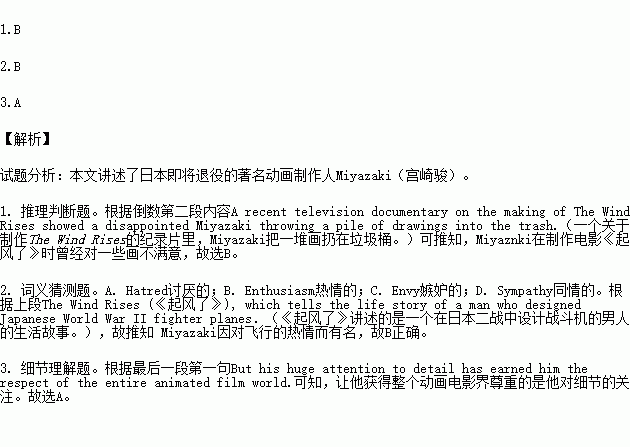题目内容
At present, animated (动画) films are popular with us. Most of them rely heavily on computer technology. But this magical world — where witches (魔法师) cast spells and castles float in the sky — is brought to life by hand, Nevertheless, Hayao Miyazaki is referred to as Japan’s Walt Disney and considered by many to be the world’s greatest living animator.
This month, the 72-year-old Miyazaki announced his retirement. The Japanese animator has directed 11 animated full-length films over the past four decades, including the Oscar-winning Spirited Away (《千与千寻》) and his latest release, The Wind Rises (《起风了》), which tells the life story of a man who designed Japanese World War II fighter planes.
Just as The Wind Rises shows, Miyazaki is well-known for his obsession with flight, especially human flight. Other attractive aspects of Miyazaki’s films include his themes of environmental protection and the horrors of war.
Miyazaki’s work is also famous for its lack of clearly defined good and evil characters. He sees the 21st century as a complex time when old standards need to be re-examined.
As a storyteller, he is an inventor of fairy tales full of mystery. In the Miyazakian universe, wizards (巫师) turn into birds of prey; young girls are transformed overnight into 90-year-old women; greedy parents are changed into pigs; and shooting stars become fire demons (恶魔).
People attribute Miyazaki’s success to his long pursuit of his hand-drawn technique, although in an interview with CNN he called himself an “extinct species” in the age of digital animation.
A recent television documentary on the making of The Wind Rises showed a disappointed Miyazaki throwing a pile of drawings into the trash. He is said to have redrawn thousands of frames of the much-praised Princess Mononoke (《幽灵公主》) when they did not meet his standards.
But his huge attention to detail has earned him the respect of the entire animated film world. Even John Lasseter — head of Pixar, the famous US computer animation studio — once called Miyazaki “one of the greatest filmmakers of our time”.
1.What can we know about Miyazaki’s film The Wind Rises?
A. It was put on a long time ago.
B. Miyaznki was once unsatisfied with some of the drawings.
C.It describes environmental protection.
D.It is an Oscar-winning film.
2.What does the underlined word “obsession” mean in paragraph 3?
A. Hatred.B. Enthusiasm.C. Envy.D. Sympathy.
3.What makes Miyazaki earn the respect of the entire animated film world?
A. His emphasis on detail.
B. His pursuit of the hand-drawn technique.
C. His dependence on computer technology.
D. His definition of good and evil characters.
 科学实验活动册系列答案
科学实验活动册系列答案
